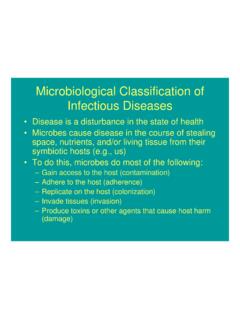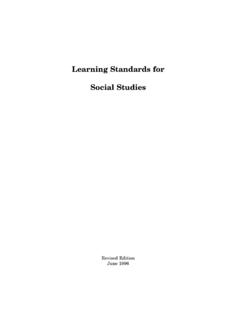Transcription of Epidemiology: the foundation of public health
1 Detels - Page 1 Epidemiology: the foundation of public health Roger Detels, , Abstract Epidemiology is the basic science of public health , because it is the science that describes the relationship of health or disease with other health -related factors in human populations, such as human pathogens. Furthermore, epidemiology has been used to generate much of the information required by public health professionals to develop, implement, and evaluate effective intervention programmes for prevention of disease and promotion of health , such as the eradication of smallpox, the anticipated eradication of polio and guinea worm disease, and prevention of heart disease and cancer.
2 Unlike pathology, which constitutes a basic area of knowledge, and cardiology, which is the study of a specific organ, epidemiology is a philosophy and methodology that can be applied to learning about and resolving a very broad range of health problems. The art of epidemiology is knowing when and how to apply the various epidemiological strategies creatively to answer specific health questions; it is not enough to know what the various study designs and statistical methodologies are. The uses and limitations of the various epidemiological study designs are presented to illustrate and underscore the fact that the successful application of epidemiology requires more than a knowledge of study designs and epidemiological methods.
3 These designs and methods must be applied appropriately, creatively, and innovatively if they are to yield the desired information. The field of epidemiology has been expanding dramatically over the last three decades, as epidemiologists have demonstrated new Detels - Page 2 uses and variations of traditional study designs and methods. We can anticipate that the scope of epidemiology will expand even more in the future as increasing numbers of creative epidemiologists develop innovative new strategies and techniques. The chapters in this section present detailed discussions of the principles and methods of epidemiology.
4 In this introductory chapter, I will attempt to define epidemiology, to present ways in which epidemiology is used in the advancement of public health , and, finally, to discuss the range of applications of epidemiological methodologies. What is epidemiology? There are many definitions of epidemiology, but every epidemiologist will know exactly what it is that he or she does. Defining epidemiology is difficult primarily because it does not represent a body of knowledge, as does, for example, anatomy, nor does it target a specific organ system, as does cardiology. Epidemiology represents a method of studying a health problem and can be applied to a wide range of problems, from transmission of an infectious disease agent to the design of a new strategy for health care delivery.
5 Furthermore, that methodology is continually changing as it is adapted to a greater range of health problems and more techniques are borrowed and adapted from other disciplines such as mathematics and statistics. Maxcy, one of the pioneer epidemiologists of the past century, offered the following definition: Epidemiology is that field of medical science which is concerned with the relationship of various factors and conditions which determine the frequencies and Detels - Page 3 distributions of an infectious process, a disease, or a physiologic state in a human community (Lilienfeld 1978).
6 The word itself comes from the Greek epi, demos, and logos; literally translated it means the study (logos) of what is upon (epi) the people (demos). John Last, in the Dictionary of Epidemiology, has defined epidemiology as The study of the distribution and determinants of health -related states or events in specified populations, and the application of this study to the control of health problems. Last s definition underscores that epidemiologists are not concerned only with disease but with health -related events , and that ultimately epidemiology is committed to control of disease.
7 All epidemiologists, however, will agree that epidemiology concerns itself with populations rather than individuals, thereby separating it from the rest of medicine and constituting the basic science of public health . Following from this, therefore, is the need to describe health and disease in terms of frequencies and distributions in the population. The epidemiologist relates these frequencies and distributions of specific health parameters to the frequencies of other factors to which populations are exposed in order to identify those that may be causes of ill health or promoters of good health .
8 Inherent in the philosophy of epidemiology is the idea that ill health is not randomly distributed in populations, and that elucidating the reasons for this non-random distribution will provide clues regarding the risk factors for disease and the biological mechanisms that result in loss of health . Because epidemiology usually focuses on health in human populations it is rarely able to provide experimental proof in the sense of Koch's postulates, as can often be done in the laboratory sciences. Epidemiology more often provides an accumulation of Detels - Page 4 increasingly convincing indirect evidence of a relationship between health or disease and other factors.
9 This process, referred to as causal inference (see Hoggett & Greenland, Ch. ), includes considering an observed relationship in terms of its strength, consistency, specificity, temporality, biologic gradient, plausibility, coherence and experimental evidence (Hill 1965). Although they will differ on the exact definitions of epidemiology, most epidemiologists will agree that they try to characterize the relationships among the agent, the environment, and the host (usually human). The epidemiologist considers health to represent a balance among these three forces, as shown in Figure 1.
10 Changes in any one of these three factors may result in loss of health . For example, the host may be compromised as a result of treatment with steroids, making him/her more susceptible to agents that do not ordinarily cause disease. On the other hand, a breakdown in the water-supply system may result in an increased exposure of people to agents such as cryptosporidium, as happened in 1993 in Milwaukee, WI (MacKenzie et al. 1994). Finally, some agents may become more or less virulent over time--often because of the promiscuous use of antibiotics--thereby disturbing the dynamic balance among agent, host, and environment.
















